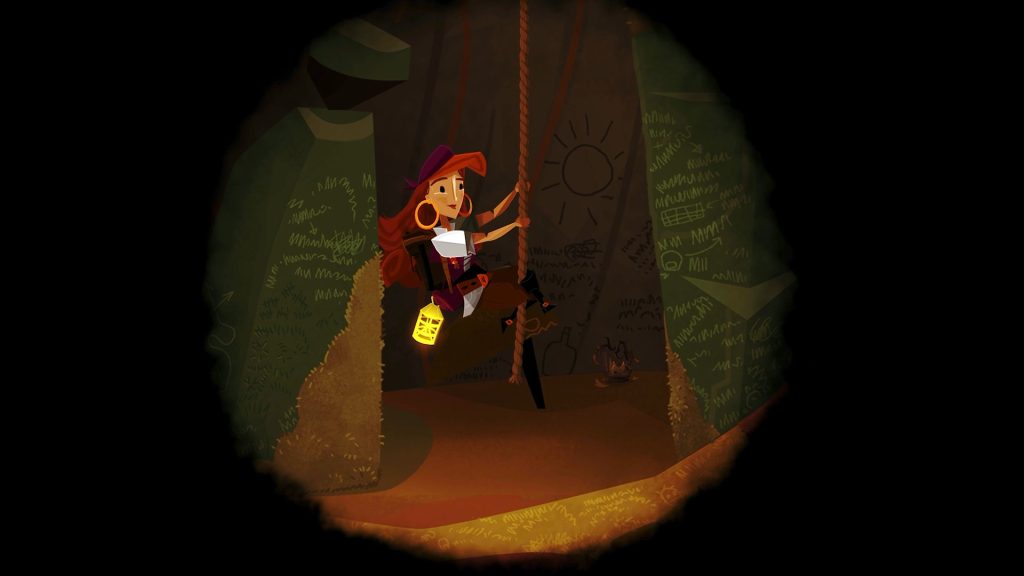
Narrative games festival LudoNarraCon 2023 concluded yesterday. Once again, the event – organized annually by indie label Fellow Traveller – brought together panels and talks, as well as presentations and sales of games that focus on storytelling.
One of the featured panelists was Ron Gilbert, a veteran and legend of videogame storytelling, whose credits include LucasArts’ Maniac Mansion and The Secret of Monkey Island as well as Total Annihilation (Cavedog) and The Cave (Double Fine). Last year, he wrote Return to Monkey Island (Devolver Digital), a modern point-and-click adventure that was warmly received by critics.
In a “fireside chat” with IGN senior reporter Rebekah Valentine, Gilbert talks enthusiastically about the power of narrative games, and how writing for games has changed so much over the years.
When Maniac Mansion was released in 1987 the term “narrative game” was not in common usage. It was a comedic graphical adventure set in a house-of-horrors. Inspired by text-adventures, but using a lovely art style and intuitive player interface, the game is now viewed as a classic.
“Maniac Mansion was a narrative game,” says Gilbert. “At some level, not much has changed. Graphics are a lot better and the way we interact with them [is] a lot more sophisticated. But at its core, it’s about storytelling. Human storytelling has been around for thousands of years. Hopefully [developers] are really leveraging basic storytelling knowledge as opposed to computer storytelling.”
Team size change
Looking back at his decades in game development, Gilbert says that the biggest change he’s seen is in scale. Development teams are much larger than they were. Even the relatively modest project Return to Monkey Island was built by a team of 25, while the original Monkey Island was built by “five or six people”.
Gilbert believes that much has been gained by gaming’s growth, both in terms of market size and development scale. But he regrets the loss of creative spontaneity that came as part and parcel of early game writing.
“Monkey Islands 1 and 2 were very much improv games. I had an outline of where I wanted to go with places and puzzles and characters. But then the actual process of building it – there was this improv element to it. I liked that [the team] would have lunch together and if we laughed about something it was in the game that afternoon.
“We could iterate that quickly. It’s a little different today because art is such a production, and it takes a long time to do things. We can’t just, on an impulse, change the way something exists.”
He says that, although he spends hours talking with development team members every day, often via calls and video conferencing, remote working also limits spontaneity. “It’s just different than walking into an artist’s office and looking over their shoulder and saying ‘oh that’s funny; more of that’.”
Voice input
Another major change is the importance of voice acting. “There is a point where you have to lock down your script. A lot of times that is months before the game ships,” he says, adding that he enjoys working with voice actors. He tries to give them freedom to interpret and express his characters in their own way.
“Voice acting adds a whole new layer because now you have real actors that are adding to the comedy, to the scene,” he says. “Anytime you’re writing, you’re imagining this voice in your head. This is what this character sounds like and this is the way they’re going to speak. Then you go into the studio, and you hear an audition and you really like that, and everything is thrown out.”
“We want to give the actor the freedom to be able to do what they do with the character and if that means changing the character a little, then so be it.”
Narrative range
Gilbert says that the growth of the gaming market has opened up huge opportunities for developers, especially those who “have something to say,” which he cites as the most important element of writing.
“There are so many people playing games these days that you can have niches that are viable markets – things like point and click adventures. They’re not going to sell tens of millions of copies like some triple-A game, but there’s enough people who like those things – you can have success. It’s really good when the market is large enough and healthy enough that it can support strong niches.”
Market scale also means that developers are able to tell a more diverse range of stories. “Games like Maniac Mansion or Monkey Island – there were some serious elements that we captured, but they weren’t serious stories. They were fun stories. Now, you can have games that are about more serious subjects. They don’t have to be essentially cartoons and they can cover really interesting stuff.”
Gilbert says he’s an admirer of South of the Circle, a narrative love story set against a backdrop of climate change and international tensions. “That’s a serious story. It doesn’t feel like a cartoon. Having more games like that is a good thing.”
You can find Gilbert’s talk, and other LudoNarraCon 2023 panels here.
Colin Campbell has been reporting on the gaming industry for more than three decades, including for Polygon, IGN, The Guardian, Next Generation, and The Economist.
 GameDaily.biz © 2025 | All Rights Reserved.
GameDaily.biz © 2025 | All Rights Reserved.